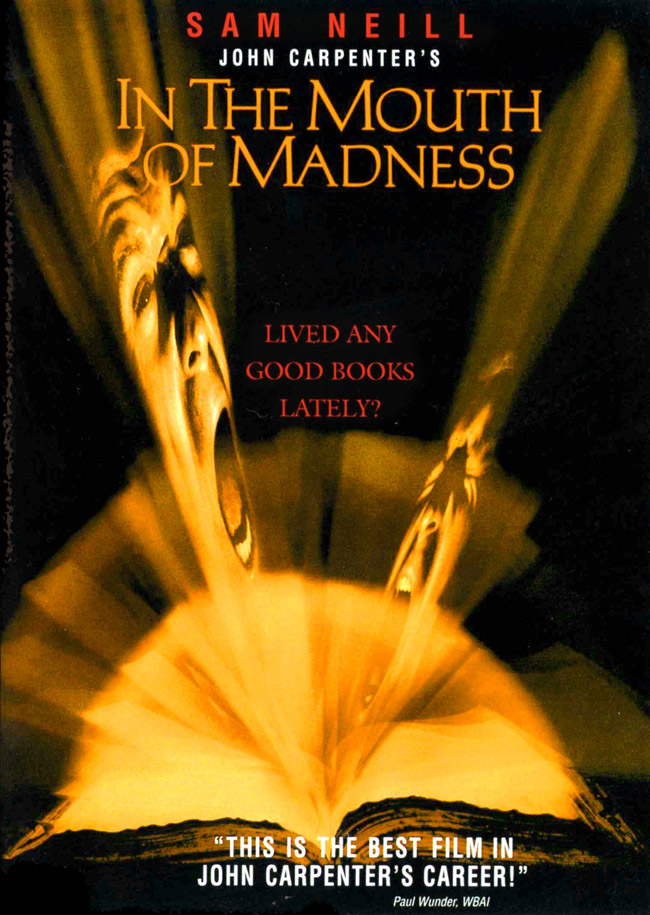Insurance investigator John Trent is dragged struggling into a cell within an institution for the hopelessly deranged. Visited by one Dr Wrenn he recounts his story: months ago he was hired to investigate claims made by a book publisher for the disappearance of one of their most prominent writers of terror novels - Sutter Cane. Sniffing a publicity stunt on the eve of the release of one of Cane’s most anticipated books Trent begins scrutinizing the situation more closely. After the meeting with the publishers he picks up a number of Cane’s books to see if there’s anything to fathom from those, however the perpetually sceptical man soon finds himself being drawn into the illusion of Cane’s supernatural domain as he spends the next day or two reading. Realising that the covers of Cane’s books contain a hidden map, presumably offering a clue as to the author’s whereabouts, Trent sets off on a long drive with one of the publishing assistants despite not being aware of precisely where Cane’s possibly fictitious town is. However, after a couple of days of driving and a number of odd encounters on the road they arrive at the place which, as far as any map is concerned, doesn’t exist - Hobb’s End. As strange occurrences begin to increase with frequency it appears to Trent that the possibilities of a publicity stunt were left behind long ago, and in its place is an uncanny nightmare that almost suggests that Cane has created everything that is happening. Or Trent has gone insane.
The film’s story confronts the idea that gruesome fiction can warp the minds of its followers, or at least that’s what it appears to be confronting although if this is a moral angle of some kind I see it as a slightly hypocritical ideal - preaching the pitfalls of horror on the human mind within a horror vehicle designed to entertain. Aside from this hiccup the movie winds up being one of the best interpretations of H.P. Lovecraft’s worlds of terror that’s not actually based on any specific Lovecraftian work. It sort of welds Stephen King to Lovecraft (the antagonist, Cane, representing the former, the domain he creates representing the latter) with a degree of success. Trent’s largely retrospective story is told from the cell of an insane asylum (a characteristic of many Lovecraft stories) as he recounts how the world outside began to go crazy during the release of Sutter Cane’s latest novel to a blood-hungry public. In flashback he recalls noticing a thriving aggressive madness swelling around him as interest in the book became feverish, his own understanding of reality beginning to break down as he investigated the disappearance of the author - there are shades of Videodrome here (confusion of where the line between fantasy and reality lies resulting from immersing oneself in some form of entertainment). His trip into the fictitious town that may or may not have been created out of the imagination of a man is suitably nightmarish and one of Carpenter’s best realisations of the essence of terror in film. Illustrations of this include the strange geriatric cyclist who’s really a boy that can’t escape Hobb’s End, a sadistic old lady who mutates into a multi-tentacled monster, a psychotic crowd of children, Trent’s repeatedly unsuccessful attempts to escape the homicidal townspeople, etc. As with a number of his other projects, Carpenter was heavily involved with the music and this really announces itself over the lead titles as pounding metal guitar accompanies images of a printing press producing thousands of books that will eventually spread insanity across the globe. Therein lies the apocalyptic thread that flourishes throughout much of the director’s other material - The Thing, Prince of Darkness, Escape From New York… What I ultimately love about this movie is its inherently inexplicable nature, something substantiated by the conclusion - leaving the horrifying without explanation grants it the power to tantalise. It’s possible that Trent investigates the author’s absence and goes mad in the process, but this is only one possibility and, as usual, I enjoy this kind of ambiguity.
Unjustifiably this has never reached the UK on disc. Back in the nineties good old EIV put out a cropped fullscreen tape (which I believe was later followed by a widescreen version). It’s common knowledge that Carpenter prefers shooting in anamorphic Panavision (2.39:1) and his visuals always look unreasonably compromised when dissected in such artistic blasphemy. The US DVD was released years ago by New Line and contained both wide and fullscreen options (allowing the viewer to make comparisons to identify just how butchered a cropped Panavision image is in fullscreen), a trailer and a commentary from director and cinematographer. Later on a Blu-ray was thankfully let out on to the US shelves, again by New Line - the HD image (only the widescreen option on this disc) is noticeably superior to the previous editions in every respect, and projected on to a large screen looks really cinematic. Sound is given a boost also with DTS HD MA, while it's appreciated that the commentary has been retained. I am somewhat doubting there will ever be a truly special edition, but in terms of its excellent transfer, this Blu-ray is the only sensible way to buy and watch In The Mouth of Madness.


Carpenter's last good movie, an under-rated gem
ReplyDeleteDefinitely under-rated, though I quite like 1998's Vampires myself. Have not seen The Ward yet though so can't really comment on that (though I've heard that, whilst it's competent, it could also have been directed by anyone and doesn't really announce itself as a Carpenter film as such).
ReplyDelete